Your boiler generally works at a certain pressure level for it to deliver hot water or central heating in your home. However, you’ve probably noticed that your boiler loses pressure over time. This can be because of a few different reasons, but there are steps you can follow to recognize and solve your specific problem.
A boiler can lose pressure because of a pressure relief valve which has been left open or is faulty, air leaking into the boiler piping, a water leak, or a faulty expansion vessel. Poor water inflow, or a faulty pressure gauge can also create low pressure. Please note, however, that it is normal for the boiler to have slight fluctuations in its pressure (usually up to 1 bar) in its natural process of heating and cooling.
In this guide, we explain all the possible reasons why your boiler is losing pressure, including both normal circumstances and potential problems. By understanding the causes, diagnosing your problem, and implementing the right solution, you can make sure your boiler works smoothly and effectively, providing reliable heating for your home.
6 Reasons Why Your Boiler Is Losing Pressure
Here are all the reasons why your boiler is losing pressure:
Water Purification Guide also has a complete breakdown of why you need to keep adding water to your boiler available here.
1. Leaks in the System
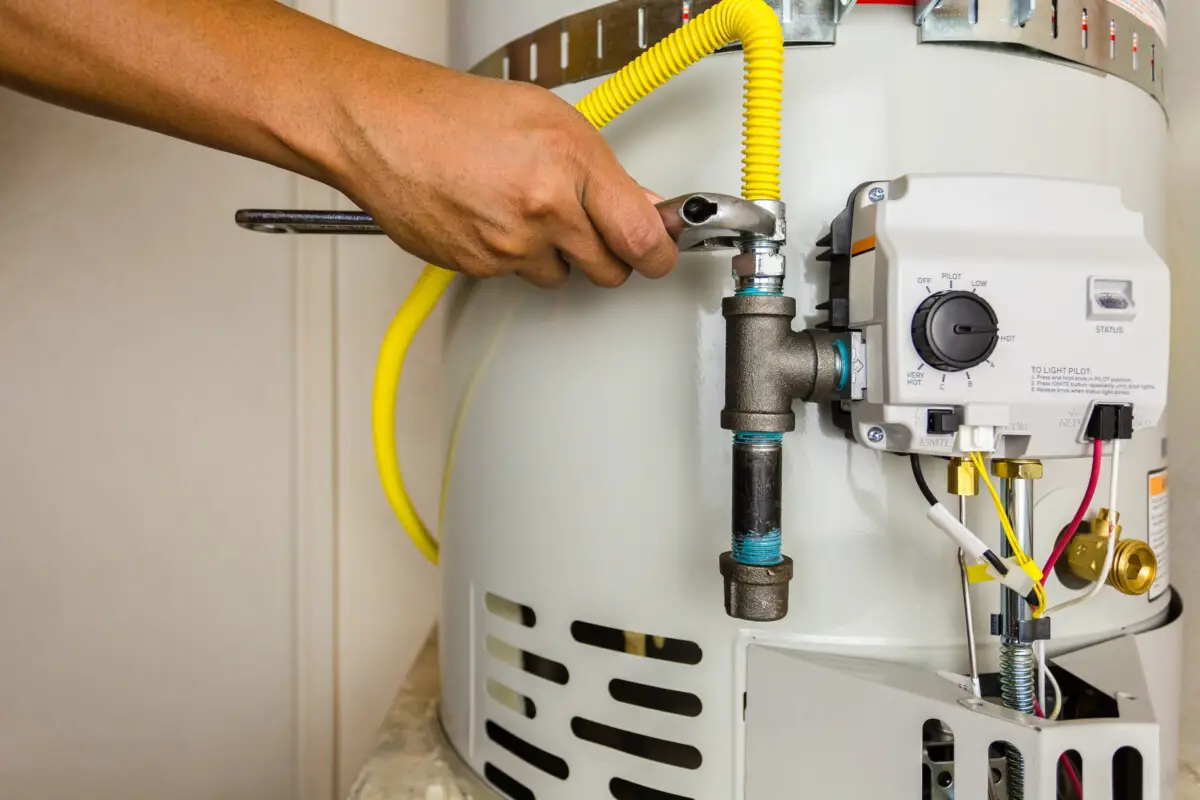
Leaks are by far the commonest cause of pressure loss in boilers.
A boiler is made up of many parts, including pipes, valves, radiators, and fittings.
If there is even the tiniest of openings in any of these parts, hot water can escape from it, which can dramatically lower the pressure in your boiler system and reduce its ability to heat water.
How to check if there are leaks in my boiler system
Leaks in a boiler system are sometimes quite easy to detect, but sometimes, there can be hidden leaks which are not obvious at first glance.
If you notice dripping water drops, dampness, hissing sounds or mold growth near your boiler or heating system, it’s likely there’s a leak.
The following steps are helpful:
- Inspect the entire heating system for visible leaks around pipes, radiators, valves, and fittings. Take extra care to look around any connections as these are the most common place to find leaks.
- Look (and listen) for hissing sounds, water stains, dampness, or even mold on the surrounding walls.
- Repair or replace any damaged components. We recommend doing this yourself only if you have experience with plumbing. Otherwise, the best approach is to seek professional help.
- If the leak is not visible, contacting a plumber is usually the only option.
2. Faulty Pressure Relief Valve
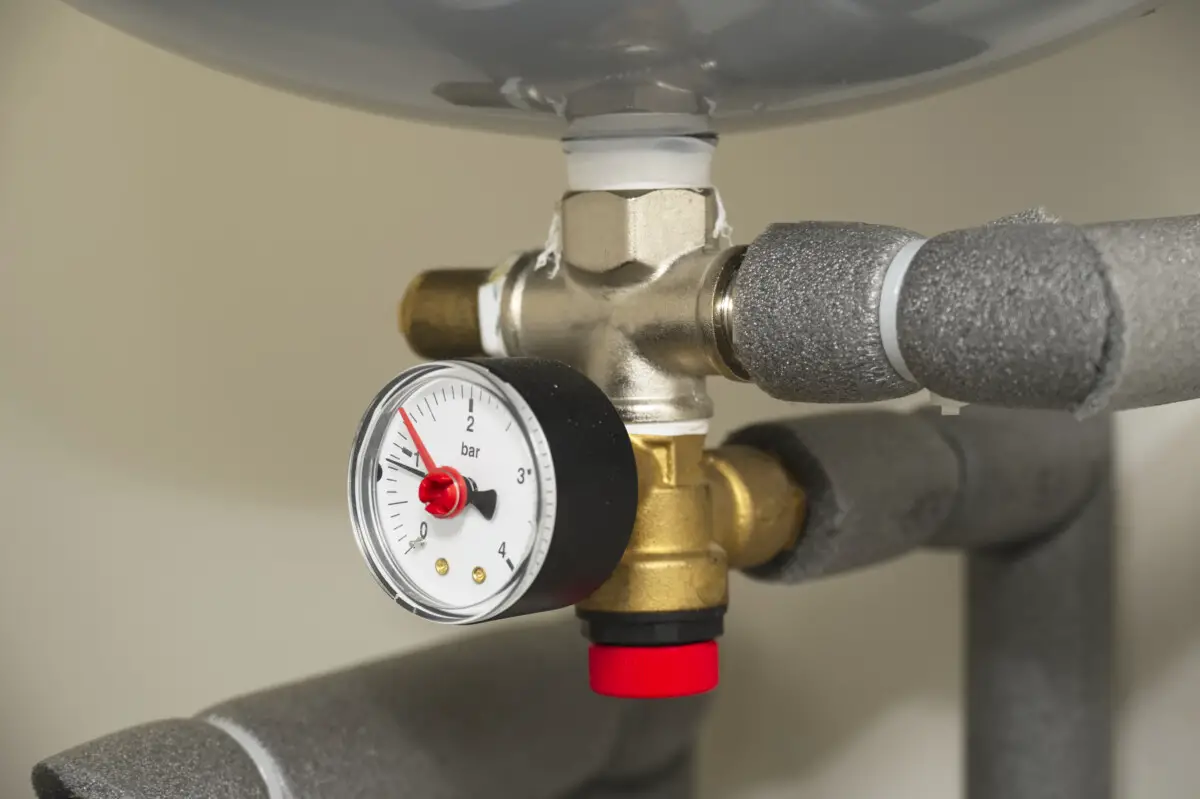
Your boiler includes a “pressure relief valve” somewhere in its system (it varies depending on your model). Whenever the pressure inside the boiler system becomes too high, this valve is designed to open, so that it can release excess pressure from the boiler and prevent damage.
Now if someone accidentally left this valve open, or worse, if the valve itself is malfunctioning, you will notice your boiler has continuously low pressure.
This is important to note, because a healthy pressure release valve will only release pressure intermittently, and only when needed (not constantly)
How to know if there is an issue with your pressure valve
Signs of a faulty pressure relief valve include water discharge from the valve’s overflow pipe or persistent pressure drops.
You can take the following steps:
- Start by looking at your boiler manual/instructions to identify where the pressure release valve is on your specific system. You can also contact your manufacturer for help.
- Check the pressure relief valve for signs of leaks or damage. Signs include a constant hissing sound and water surrounding the valve itself. Sometimes mold can also be found around the valve.
- If necessary, replace the pressure relief valve with a new one that matches the manufacturer’s specifications.
- You can use your boiler’s manual or contact a professional for guidance on how to replace the valve properly. If you are not confident in doing it yourself, we do not recommend taking a DIY approach here. Do not hesitate to contact your plumber!
3. Faulty Expansion Vessel
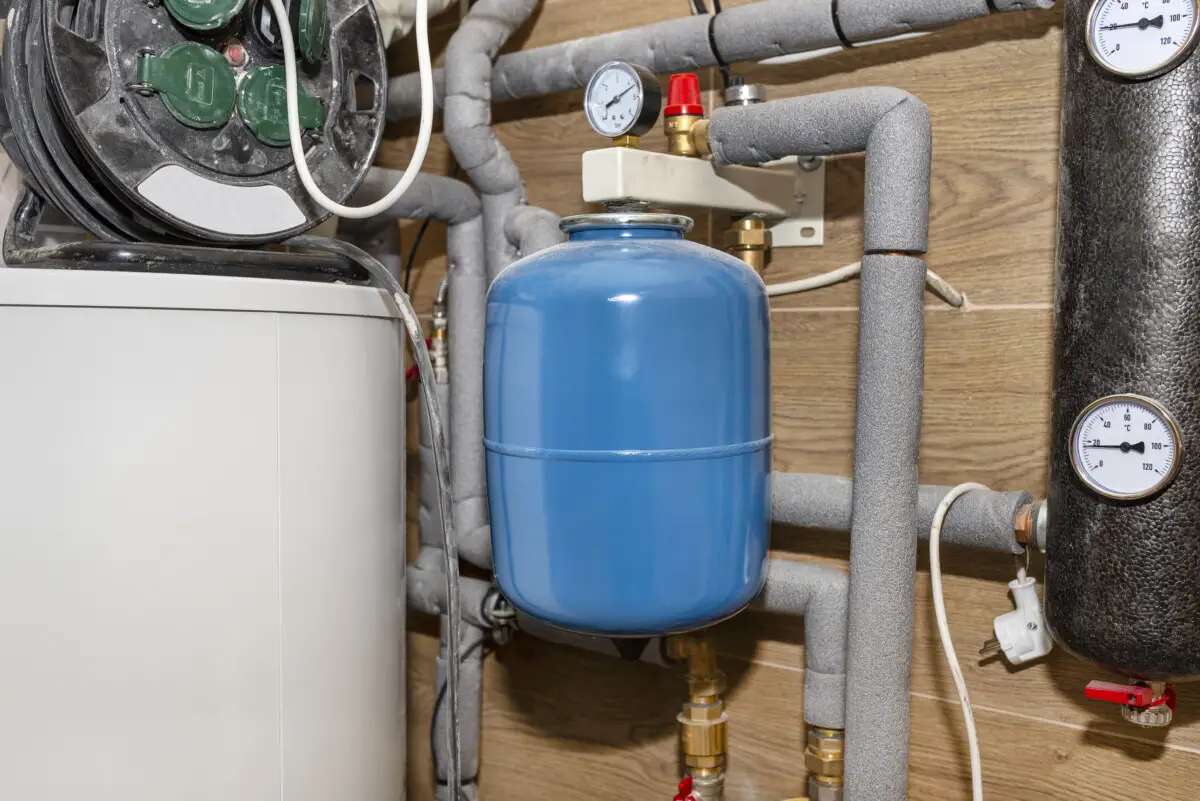
In addition to the pressure release valve, most boiler systems have an ‘Expansion vessel’ to allow for increases and decrease in pressure within the system.
This expansion vessel plays an important role in compensating for the expansion and contraction of water within the boiler as it heats the water.
If the vessel loses its ability to hold pressure, it can result in pressure loss in the boiler itself.
How to identify if a faulty expansion vessel is causing low boiler pressure
Identifying whether or not the pressure drop in your boiler is caused by a faulty expansion vessel can be tricky, so it is highly likely you will need a professional to take a look.
If you do have some experience with boilers, however, it might be possible for you to check it yourself. For this, follow these steps:
- Check the pressure in the expansion vessel using a pressure gauge.
- If the pressure is persistently too low, it can indicate a faulty vessel that needs to be recharged or replaced.
- After turning off the boiler and electrical supply, open the vessel by releasing the cap from the pressure valve and pressing the pin, then look (and listen) to see if air or water comes out.
- If air and water come out, the vessel is faulty and needs replacing.
- If water comes out, the vessel is faulty and needs replacing.
- If air comes out, either the vessel is fine, or it doesn’t have enough air and will need to be repressurized.
- If low or faulty, contact a professional to service or replace the expansion vessel.
4. Air in the System

A major difference between air and liquid is that air is compressible, while liquids cannot be compressed.
If there is air trapped in your heating system, then this air will compress when the motor is on, which reduces the overall pressure balance in your boiler system.
Even a small number of air bubbles can seriously disrupt the water flow, which can change the pressure even more.
Air bubbles are a really common problem in everything related to plumbing, so don’t be surprised if this is your boiler’s issue.
How to check if air is causing my low boiler pressure
While it isn’t easy to tell if there is air trapped in the boiler piping, it’s quite easy to solve by simply bleeding the radiators, which is a very effective way to release trapped air.
Begin with the lowest radiators and work your way up, using a radiator key to open the bleed valve until water flows steadily from the radiator.
If there are air bubbles in the system, this should help clear them up.
Remember to check the boiler pressure afterwards, and adjust if necessary.
Water Purification Guide also has detailed information on how to check your boiler water level (and top it up) available here.
5. Faulty Seals or Valves
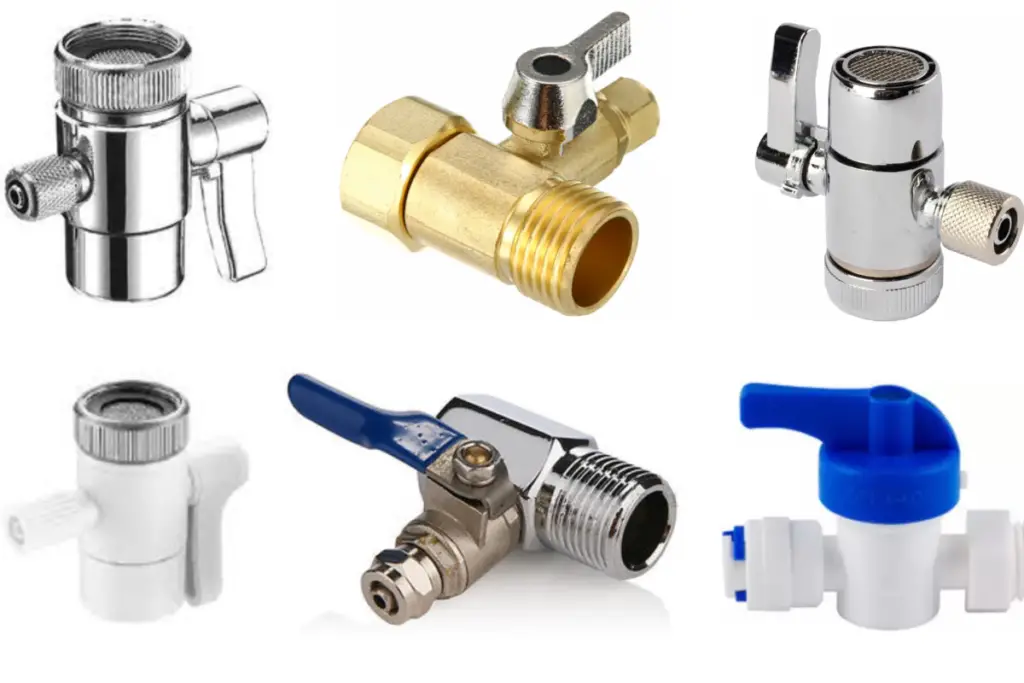
Your boiler system has multiple seals, fittings and valves. If they are old and worn-out, which happens to every component over time, there can be small leaks.
Gradually, this leads to a loss of pressure in the boiler.
It’s also important to check that the valves that should be open, are actually all the way open (not just partially open) as this also affects the pressure.
How to know if faulty seals or valves are decreasing my boiler pressure
It’s fairly easy to see if there are faulty seals or valves in your boiler system, as long as you have access to where these valves and seals are. Follow these steps:
- Inspect each seals and valves for signs of damage or leakage. You may also need to open them. Remember to look especially careful at any rubber components for cracks.
- Replace any faulty parts to restore proper pressure in the system.
6. Faulty Pressure Gauge
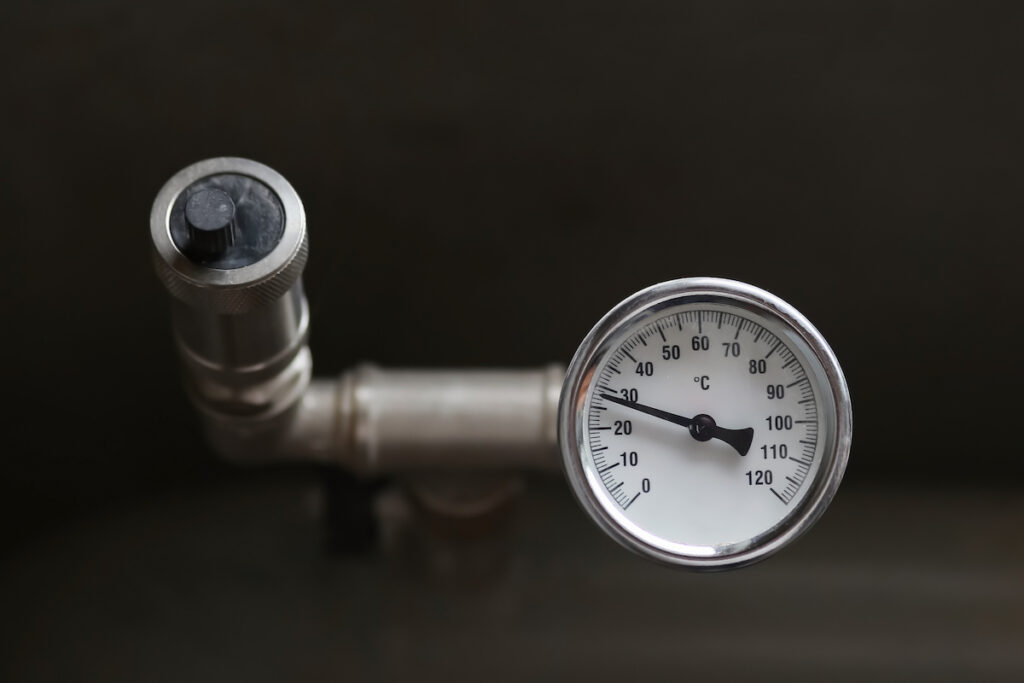
Sometimes, the pressure gauge may be consistently showing you low pressure on the boiler, even when the boiler seems to be working perfectly fine.
In such cases, it’s possible that the fault is in the pressure gauge itself.
Especially if you can’t find any problem with your boiler.
Before diagnosing this as the issue, however, you must make sure that all other possible causes have been rationally ruled out.
Remember, if you are not sure about diagnosing or fixing any boiler-related issues, we advise seeking professional assistance.
Please also note that tampering with the boiler parts can sometimes void your warranty – if you have one.
How to increase boiler pressure
Increasing boiler pressure is fairly easy to do, and you should generally be able to do it without calling in an engineer! For a conventional boiler, you can simply follow these steps:
- First, read the instruction manual. This is so you know where the valves are and what they do on your specific model. Your objective is to identify the valve(s) that allow water to enter the boiler system. This is known as the filling loop, and usually consists of two valves. If you don’t have your instruction manual, most are available online.
- Switch off the boiler, and allow it to cool.
- Open both valves of the filling loop.
- Keep an eye on the pressure gauge as you do this.
- Once the pressure reaches 1-1.5 bars, close both the valves.
- Turn the boiler back on, and it should be good to go.
When To Add Pressure to a Boiler
Generally, a properly functioning boiler should maintain a relatively stable pressure over time, and you shouldn’t have to frequently add pressure to your boiler.
If you have noticed that you are regularly topping up the pressure in your boiler yourself, it’s usually a sign of an underlying issue. Please use the troubleshooting guide at the start of this article for details.
What is the Normal PSI for a Boiler?
Each boiler brand is different, and you should consult your manufacturer’s instructions to understand what the optimal pressure for your boiler is.
Most home boilers operate within a pressure range of 12 to 15 pounds per square inch (psi), which may be displayed as 1-2 bar units.
Frequently Asked Questions
Can a Boiler Lose Pressure Without a Leak?
In some instances, it is possible for a boiler to have a decrease in pressure without any visible signs of leakage.
Issues with the pressure relief valve, air in the system, or poor pressure in the inflow water, can create low pressure in a boiler without a leak.
Even under normal circumstances, the expansion and contraction of the heating system due to temperature fluctuations can cause a slight drop in pressure in your boiler. This is usually not a cause for concern though.
Should Boiler Pressure Drop to Zero When Not in Use?
Even when not in use, the pressure in your boiler should not drop to zero.
Ideally, the pressure should remain relatively stable even during periods of inactivity as long as there is water filling the pipes of your boiler system.
As we mentioned earlier in the post, a sudden pressure drop to zero could be a result of a faulty pressure relief valve, a leak in the system, or a malfunctioning pressure gauge.
Is low boiler pressure dangerous?
Usually, a low boiler pressure is not dangerous.
Low boiler pressure could cause your room heating or your hot water flow to not work perfectly. However, this is more of a nuisance than outright danger.
An exception is when there is a sudden drop in pressure. This could indicate a leak in the system somewhere, meaning a part of your house might be getting filled with water. This could be dangerous depending on where the leak might be (near a power source, for example).
Is high boiler pressure dangerous?
High boiler pressure is usually not dangerous due to safety mechanisms that are inbuilt in your boiler system.
Most boiler systems these days come equipped with a pressure release valve and/or an expansion vessel to accommodate for any increase in pressure.
In case these mechanisms are absent, however, and if there are weak connections/fittings in your system, a high boiler pressure may rarely cause hot water or even steam to leak out. This could potentially be dangerous based on where the leak is.
Conclusion
Your boiler may be losing pressure due to multiple reasons, including normal circumstances and underlying problems like leaks in the system, a faulty pressure release valve, air in the system, a faulty expansion vessel, or even a faulty pressure gauge.
While it may be possible for you to take the first steps towards diagnosing the issue, it is likely that you will need professional help to identify and solve most of these problems.
Regular maintenance, timely repairs, and professional assistance when necessary will help ensure the longevity and efficient operation of your boiler, providing reliable heating for your home for years to come.
